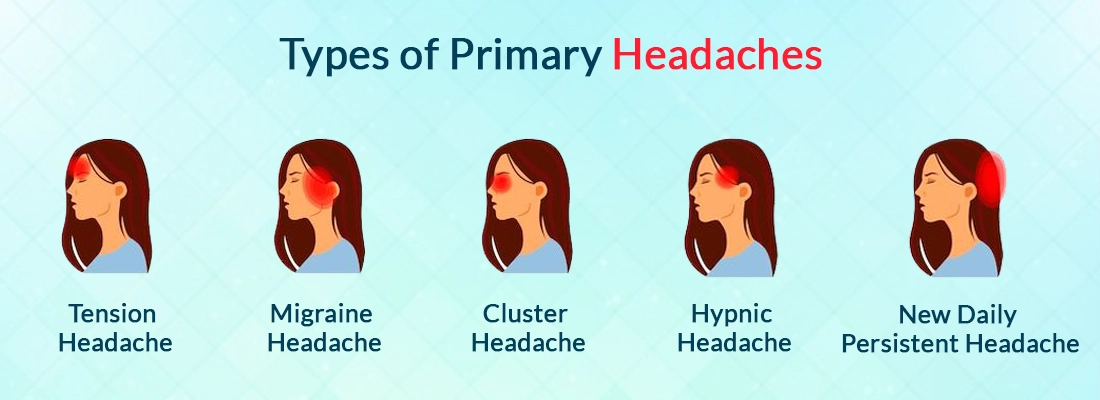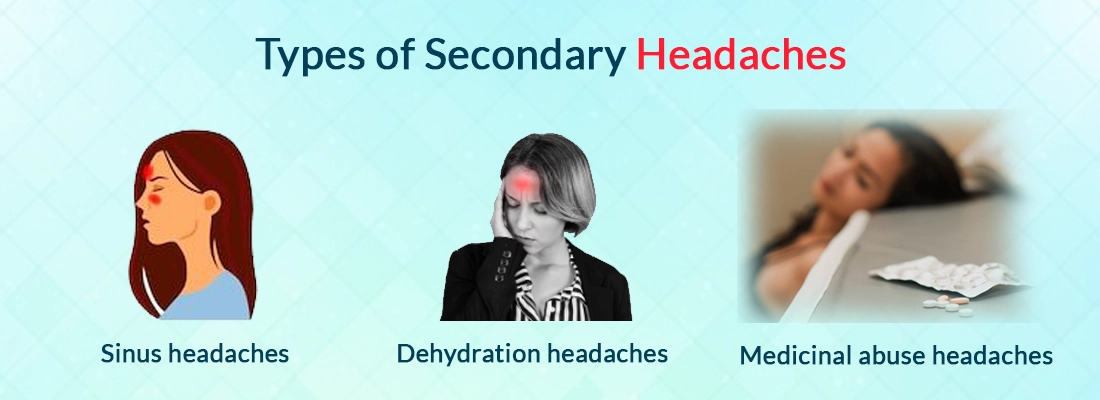
Headache is one of the most commonly occurring symptoms. We often wonder if the headache is indicative of a disease or is happening just like that. In this blog we will discuss about the types of headache, their preventive...
A headache is defined as pain in head which can be radiating to the face, shoulder etc. it can be defined as a throbbing and continuous pressure which can be sharp and shooting and dull or faint as well. Different headaches present differently based on the type of pain, severity, location and frequency of pain.
There are various types of headaches amongst which most are nothing to be worried about but some headaches can be a symptom of dangerous disease/condition.
What Are the Types of Headaches?
Headaches are majorly categorised into two subcategories which are primary headaches and secondary headaches.
Primary Headaches

Primary headaches present when there is over-activity or dysfunction of pain and sensitivity features. Primary headaches can be caused due to genetic predisposition, they are not necessarily a symptom of underlying medical condition.
Types of primary headaches
- Tension headache
- Migraine headache
- Cluster headache
- Hypnic headache
- NDPH (new daily persistent headache)
Primary headaches can be triggered by lifestyle-
- Alcohol consumption
- Food triggering headaches- like processed meats that contains nitrates
- Nicotine induced headache- those who consume nicotine and products containing nicotine
- Hunger headaches- due to fasting
- Coughing, sneezing, straining(such as while defecating), laughing or crying vigorously can cause primary headaches (primary cough headache)
- Changes in sleep cycle or lack of sleep
- Poor posture
- Exertion headache- due to exercise
Primary headaches can disrupt your daily activities despise being non-dangerous
Secondary Headaches

Secondary headaches represent as a sign and symptom of some underlying health condition. Once the disease/condition is resolved the headaches also get corrected
Types of secondary headaches
- Dehydration headaches
- Sinus headaches
- Medicinal abuse headaches
Some secondary headaches that can be indicative of a potential life threatening disease-
- Spinal headaches
- Thunderclap headaches
Spinal Headache
Sometimes spinal tap procedure is performed to collect CSF fluid, there are chances of spinal fluid lead which may represent as spinal headaches. Most of the spinal headaches can be treated at home only but some of them , if left untreated can progress and cause life threatening complications like subdural hematoma and seizures.
Thunderclap Headache
A thunderclap headache comes like a thunder which feels like an extremely painful headache. This type of headache can remain for a minute and longer than 5 minutes as well. Some thunderclap headaches can be harmless while some require immediate attention. Some of the considerations/causes can be-
- Head injury
- Sudden high BP
- Bleeding in brain
- Reversible cerebral vasoconstriction syndrome
How to Prevent Headache?

Headaches are recorded to be the most common reason for absenteeism. It is important to know the measures with which you can prevent a headache. Foremost consideration being maintenance of a healthy lifestyle. Other might include-
- Getting a balanced diet while including maximum possible micro and macro nutrients in them
- Sleep - to get enough sleep time can also reduce primary headaches
- Drinking enough water to keep yourself hydrated is also important to prevent headaches,
- Maining a good workout/exercise routine can help reduce stress, thereby preventing headache
- By limiting the use of alcohol, caffeine and other addictions can help prevent headaches.
How to Diagnose Headache?
Some diagnostic tools can be used to help eliminate the presence of underlying conditions that may cause migraines, cluster or tension type headaches. A diagnostic imaging test is ordered if your doctor expects underlying conditions like cancer, haemorrhage etc. diagnostic tests that may help in diagnosis are-
- CT scan
- MRI scan
- PET scan etc.
There are other diagnostic techniques in which your doctor might ask about your headache history including-
- How the headache feels
- The frequency of headache
- The duration of each headache episode
- The amount of pain it causes you
- About their triggering factors such as food, beverages etc.
- The amount of caffeine intake
- Your stress level
- About your sleep habits
- When the first headache started
- By identifying the type of headache
- Family history of headache
- If you get a headache after physical activity
After collecting a brief history of your headache, your doctor might look for other sign and symptoms such as
- Fever
- High BP
- Excessive fatigue
- Infections
- Problem in vision like blurry, double vision or blind spots
- Mental personality changes or other problems
- Fainting
- Muscle weakness, tingling or numbness
- Problem standing and maintaining balance
- Seizures or epileptic attack
- Nausea vomiting
- Other neurological problems
After all the necessary data is collected along with diagnostic imaging, it becomes easy to treat the type of headache along with its cause.
When to See a Doctor?
You should seek immediate doctors attention if-
- Your headache is severe along with stiff neck, fever, nausea or vomiting
- If a headache is causing facial drooping, numbness, weakness or inability to raise an arm.
- If you are having a seizure attack with headaches and shortness of breath
- If headache is accompanied with loss of consciousness, double or blurry vision and mental confusion
- Of headache persists after a head injury or if it does not begin right after a head injury
- If sudden changes in severity or pattern of headache happens
Summary
Headache can keep one awake and can happen right when you wake up, these can be due to some underlying conditions. You can always prevent the incidence of a headache by making some lifesty;le changes. Sometimes a lifestyle change or other home remedies are not enough to get relieved of a painful headache. Frequent headaches and severe headaches can hamper the quality of life. In such cases it becomes necessary to see a doctor and get diagnosed.









